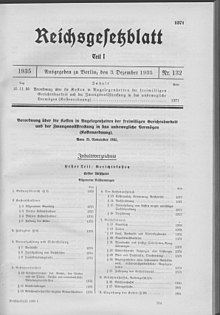Cost regulations
| Basic data | |
|---|---|
| Title: | Law on Costs in Matters of Voluntary Jurisdiction |
| Short title: | Cost regulations |
| Abbreviation: | KostO |
| Type: | Federal law |
| Scope: | Federal Republic of Germany |
| Legal matter: | Administration of justice , cost law |
| References : | 361-1 |
| Original version from: | November 25, 1935 ( RGBl. I p. 1371) |
| Entry into force on: | April 1, 1936 |
| Last revision from: | July 26, 1957 ( Federal Law Gazette I p. 861, 960 ) |
| Entry into force of the new version on: |
October 1, 1957 |
| Expiry: | 1 August 2013; Art. 45 No. 1 G of 23 July 2013 ( Federal Law Gazette I p. 2586, 2711 ) |
| GESTA : | C130 |
| Please note the note on the applicable legal version. | |
According to the German law on costs in matters of voluntary jurisdiction ( cost regulations , abbreviated KostO ), costs (fees and expenses) were charged in matters of voluntary jurisdiction , on the one hand the court costs according to the first part of the law (§§ 1–139 KostO ), on the other hand the costs of the notaries according to the provisions in the second part of the law (§§ 140–157 KostO).
As of August 1, 2013, the law on costs was incorporated in a "constitutive revision" with the title Court and Notary Fees Act (GNotKG). Since then, the KostO has only been applied temporarily in the cases defined by § 136 GNotKG.
Legal history
The cost regulations were first issued as an ordinance on November 25, 1935. It then became a law in the version of the law of July 26, 1957 ( Federal Law Gazette I p. 960 ) and has since been amended several times, including by Article 4, Paragraph 29 of the Cost Law Modernization Act of 5 May 2004 ( Federal Law Gazette I p . 718, 836 ). The latter change came into effect on July 1, 2004.
The amount of the fees was mostly based on the business value. Section 32 KostO regulated how the amount of a fee for a certain business value is calculated. A table of fees was attached to the KostO as an annex for business values up to 1,000,000 euros.
Which fees (one fee, several fees or fractions of a fee) and which expenses were charged, resulted from the individual provisions of the law.
Sections 2 - 6 KostO regulate who is liable for the costs or who is liable for the costs.
§ 8 KostO contained provisions on the payment of advance payments.
Section 14 KostO regulates the court at which the cost assessment was carried out, i.e. the cost accounting was created, and the possible legal remedies against it.
Sections 18 - 31a KostO contained more detailed provisions on business value. Section 31 KostO regulated the determination of the goodwill and the legal remedies provided against it.
Sections 36-135 contained regulations on fees in various matters, while Sections 136-139 concern expenses.
For the costs of the notaries, the regulations of the first part of the KostO on court costs applied accordingly, in some cases, §§ 140 ff. KostO contained special provisions.
literature
- Peter Hartmann: cost laws. Short comment . 42nd edition. CH Beck, Munich 2012, ISBN 978-3-406-63164-1 .
- Martin Otto: On the history of German cost law. In: Christian Fackelmann / Jörn Heinemann (eds.), Court and Notary Fees Act. Hand Commentary , pp. 31–42. Nomos, Baden-Baden 2013, ISBN 978-3-8329-7665-1 .
